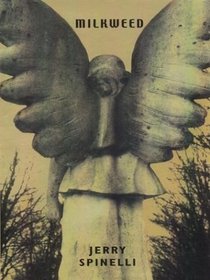Helpful Score: 1
Very thought provoking book. Very good.
Helpful Score: 1
A moving story told from the perspective of a child who survives the Warsaw ghetto. We meet Misha -- a name given to him by another orphan who finds him -- wandering the streets shortly before the German invasion with no memory of his name, his parents, or where he comes from. He seems to know he is a Gypsy. He's taken in by a band of Jewish orphans. He finds friendship and affection, as well as confusion, fear and a harsh struggle to survive and help others to live. This well-written tale doesn't sugarcoat the historical events, but it does offer hope and compassion.
Helpful Score: 1
This is a short book, can be read easily in a few days. It is the story of a young Jewish boy in Poland during World War II. He is a small boy who is for some reason, alone, feeding himself by stealing. Because he is quick and small, he is good at this and manages to stay alive and also help others stay alive by bringing them food. He is wise in some ways, and ignorant in other ways. The book is troubling because it stirs up memories of the evil that was the Nazi regime during WWII. There are no "good" Germans in this book, except for perhaps one Nazi soldier's girlfriend who does not laugh when her boyfriend and other soldiers entertain their girlfriends by throwing food at the starving Jews in the ghetto in order to see them scramble for the food. Some might find the book depressing but for the perserverence of the boy, his loyalty to others who have been kind to him, and his ability to survive. This book is similar to many other books written about the Holocaust but seen from the eyes of a young boy. Only at the very end do you meet the older man he becomes.
Helpful Score: 1
He's a boy who has lived on the streets of Warsaw as long as he can remember. He remembers no name, other than Stopthief, no parents, no home. But he's small and quick, so he manages to find enough to eat, and places to sleep -- until the Nazis come.
By then he has a name, Misha, given to him by another street boy. He has also befriended a girl, Janina, who has a family. So when Janina's family is herded into the newly created Jewish ghetto, Misha goes with them. He is able to slip in and out of the ghetto at will, so he brings food for Janina's family, as well as for Dr. Korczak's orphanage. But even for a survivor like Misha, conditions soon become unbearable -- and Misha must decide where he belongs.
By then he has a name, Misha, given to him by another street boy. He has also befriended a girl, Janina, who has a family. So when Janina's family is herded into the newly created Jewish ghetto, Misha goes with them. He is able to slip in and out of the ghetto at will, so he brings food for Janina's family, as well as for Dr. Korczak's orphanage. But even for a survivor like Misha, conditions soon become unbearable -- and Misha must decide where he belongs.
A very real and interesting perception of the war from a ignorant childs point of view. The lack of knowledge is a double edged sword for the main character. He is able to see the joy, beauty and fun in life since he has no knowledge of the climate in which he lives, he only notices changes when they affect him and his way of stealing to survive. Uri would frustrate me because he never explained anything to him so he could understand the dangers around him and not do or say stupid things. Thought provoking in the perspective of seeing this part of history though innocent eyes. A must read for children.
This is one of my favorite books of all time. it's about a young boy going through the Holocaust in Warsaw, Poland. It's funny, suspenseful, and at times very sad. And that's what makes Milkweed so great.
Milkweed was very well written as are so many of Spinelli's books. This historical fiction story was moving as well as informational for young readers. My students are very interested in the WWII period and The Holocaust. Many of them have read The Book Thief or The Boy in the Striped Pajamas, so I will recommend Milkweed to them as well. Although I personally think that it is important to bring to life the horror that occurred during this very disturbing time in our world's history, there were a few parts that I found difficult to read, which I will also warn my students about before they read it. I recommend this book to readers ages 12 and up.




